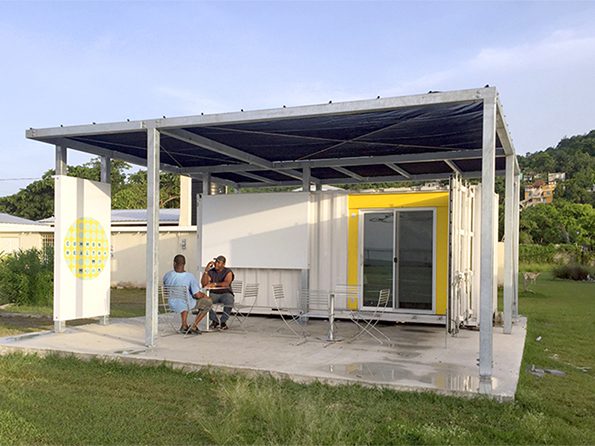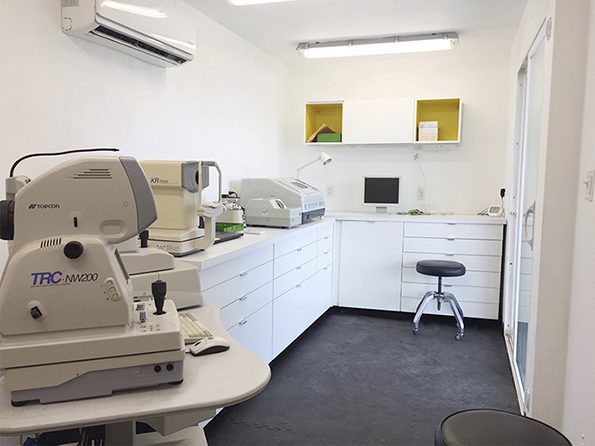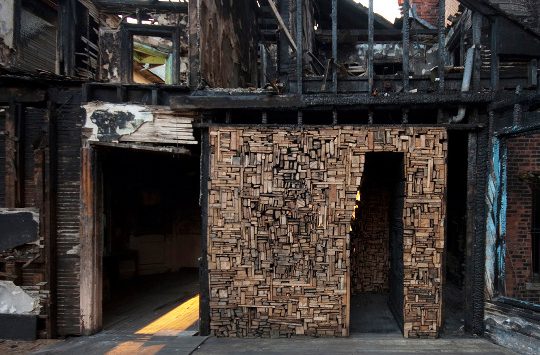
Thün, Velikov collaborate with ophthalmologists on portable Jamaican eye clinic
Attribution: UMHS News Service and Alexa St John, Michigan Daily News

Exterior look at the pop-up eye clinic in Jamaica.
It was inside-the-box thinking that led a multidisciplinary U-M team to reimagine a shipping container as an ophthalmology clinic in Jamaica.
Expected to open this month inside a 20-by-8-foot customized shipping container, the new facility is the product of an unlikely collaboration between faculty members at the University of Michigan Kellogg Eye Center, University of Michigan Taubman College of Architecture and Urban Planning, as well as the University Health Service.
The idea was to create a clinic environment that would be uniquely self-contained — something that could be outfitted in the U.S., shipped complete, and unpacked with minimal set-up into a functional health center anywhere in world. This one happens to be in Sandy Bay, a small beachside community on Jamaica’s northwest shore.
“We hadn’t done a lot of work in the kind of low-cost, large-impact design space that this project demanded,” said Geoffrey Thün, associate dean for research and creative practice at the Taubman College of Architecture. “All of the projects we get involved in are interesting, but this one combined a particularly inspiring mission with a unique set of technical challenges, and we were up for it.”
The container clinic is part of a larger Third Century Initiative grant project under University of Michigan Professor and Interim Chair of Human Genetics David Burke, Ph.D., who is developing easy-to-use technology to help patients in underserved regions monitor chronic conditions without having to travel to a doctor.

Interior look at the innovative facility.
The long-term vision of Burke’s “Deep Impact Monitoring” project calls for fully-automated technology that patients with chronic conditions can use independent of a doctor or even a medical technician. His team has been exploring potential autonomous devices across several medical disciplines and in several areas of world, including new eye imaging technology in Jamaica. That’s how he learned that U-M Optometrist Joseph Myers, O.D., was planning to ship some new eyeglass lens grinding equipment to a partner clinic on the island.
“The thinking was, if we’re sending the container down there anyway, can we add value to the container itself?” Burke said. “For a relatively modest amount of money, can we make the container into an attractive clinic where the stuff can be used?”
It turns out they could. Thün and his partner, associate professor Kathy Velikov, modified a recycled shipping container with a sliding door entry, a solar array and electrical storage batteries, insulation and climate control, a fold-out shade structure and more. Architecture graduates Kallie Sternburgh (M.Arch ‘16), Dan Tish (M.Arch ‘15) and Ya Suo (M.Arch ’15), also assisted with the design process.
The container, including the equipment, was shipped last month nearly 1,700 miles to Jamaica, where Myers and a small team of local volunteers unpacked and set it up in about three days.
“There’s a large surplus of these empty shipping containers around, and the logistics are built in because they are designed specifically to be shipped. So the idea is that this would be more cost-effective than building a new building,” said Myers. “I gave the architecture team some parameters and they ran with it. They were brilliant, showing us all of the possibilities and incorporating elements we never thought of.”
Site prep consisted largely of pouring a level concrete pad which, thanks to the container’s built-in shade awning, becomes an outdoor waiting room. Thün’s team also incorporated a screen for image projection on the exterior of the container so the space can be used for events, either medical education workshops or just general community occasions.
“We designed it to be flexible, since the specific use of the space within the container may change over time,” Thün said. “We thought a lot about standardizing the overall design while also making it flexible enough to fit the local community and cultural need.”
The prototype container clinic, which project leaders are calling “Common Health +,” will bring a brand new service to the residents of Sandy Bay. While the prototype will be manned by optometrists and opticians who will use the equipment inside to make eyeglasses for locals, future iterations are being planned to house Burke’s fully-automated diagnostic machines.
“We wanted to see how well the container-as-clinic concept worked, both from a shipping standpoint and from an operational standpoint,” said Burke. “The notion is that if we can make this work in Jamaica, we can make it work anywhere. Location independence is really the driving factor. The experience remains consistent and the quality remains high independent of where the thing gets set down.”
Velikov said the project began with a goal of finding actionable ways to address chronic care needs in remote and underserved populations.
“A lot of people in remote locations don’t have access to vision care, they don’t have access to prescription eyeglasses,” Velikov said. “It actually reduces their quality of life, it makes them unable to work and simply by diagnosing someone’s vision and providing things like eyeglasses really transforms people’s lives.”
Tish, who traveled to Jamaica last month to oversee the installation of the clinic prototype, echoed Velikov’s sentiments on the clinic’s multidisciplinary uses.
“It was exciting to see the clinic finally in operation at the end of October and start to be a hub for the community,” Tish said. “Every time we were there and the doors were open, it was like a magnet for people to come in — lots of times because no one in the community had ever received an eye care exam.”
Fellow architecture graduate Sternburgh, who is working on future developments of the clinic, particularly those that could be deployed in the United States for areas such as Highland Park in Detroit, said the clinic provides a longer-term solution to care deficiencies.








